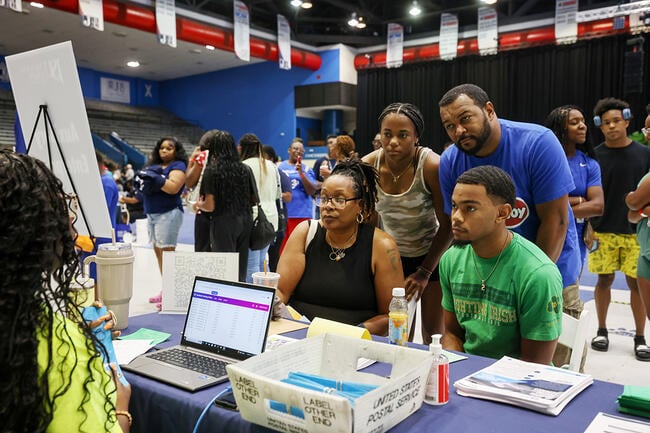You have /5 articles left.
Sign up for a free account or log in.

Jackson State University, an HBCU, is pictured here during a move-in day event. Historically, changes to Parent PLUS loans have negatively impacted HBCU enrollment.
Charles A. Smith/Jackson State University/Getty Images
A long-standing federal student loan program that has opened the door to higher education for millions of low- and middle-income families—but has also been criticized for driving families deep into debt—is at risk as Congress considers sweeping changes to higher education policy.
Both House and Senate Republicans want to cap how much parents can borrow via the Parent PLUS loan program, though they disagree about the amount. The House plan limits parents to $50,000 total, while the Senate plan would allow them to borrow up to $65,000 per dependent. Currently, the loans are uncapped, so parents can borrow as much as they need.
These loans, which are held solely by a student’s parent, were created to fill gaps left over after other forms of aid have been awarded. But they come with high interest rates and limited income-based repayment options, leaving some parents paying off the loans for the rest of their lives, according to Mike Pierce, executive director of the Student Borrower Protection Center. Research has also found that Black and Latino borrowers, who are more likely to lack other means to pay for college, disproportionately utilize Parent PLUS loans and have higher debt-to-income ratios, on average, than white borrowers.
But experts argue that capping the loans will only make the situation worse.
“What we’re most concerned about in terms of limiting or putting caps on those loans or this tool is that that may not necessarily change the amount that students, and then, by definition, their families, need to borrow to go to college, right?” said Roxanne Garza, director of higher education policy at EdTrust, a college-access nonprofit. “It’s likely going to mean that those students and their families are either going to forgo college, because they can’t borrow the additional funds they need to go to college, or what you might see as well is these students and families being pushed to the private sector.”
Pierce also noted that the worst-case scenario for these borrowers may be that they borrow up to the cap ,only to find themselves unable to secure funding for the rest of the cost of attendance, leaving their children unable to finish their degrees. (Sen. Bill Cassidy, a Louisiana Republican, said at a recent hearing that about 34 percent of those with Parent PLUS loans borrow above the House’s proposed cap of $50,000.)
The proposed caps are just one of many cuts to student aid that Congress has included in recent proposals as part of the process known as reconciliation. The House version of the bill, which includes steeper cuts and restrictions across the board, passed in late May, while the Senate continues to finalize its proposal and is planning to vote on it as soon as this week. President Donald Trump has said he wants to sign what he’s dubbed the One Big Beautiful Bill Act by July 4.
Conservative analysts who support the Republicans’ plans say the loan caps are long overdue and that the changes are necessary to fix the student loan system. They largely expect colleges to lower costs to make up the difference for families.
“Predatory lending programs like Parent PLUS allow colleges to inflate their tuition and disproportionately bury low-income families under mountains of debt. Millions of parents—often close to retirement—are putting their financial future at risk by taking on unlimited amounts of loans,” a spokesman for the House Education and Workforce Committee told Inside Higher Ed. “Setting reasonable caps, along with accountability for schools to drive tuition prices down, helps ensure students still have access to higher education that is worth the cost while keeping families out of crushing debt.”
But college-accessibility advocates have warned that the legislation will inevitably make college less affordable and loans more difficult to pay off for millions of Americans.
“You’re taking a program that is a successful ladder to the middle class for people from lower-income backgrounds, you’re making it less protective, and then you’re giving tax cuts to billionaires and big corporations,” Pierce said. “Somebody described this bill as reverse Robin Hood, and I think that actually what’s happening with student loan programs is one of the most extreme examples of that, because this is a set of policies that do allow people to move up in our economy, and we’re just slamming the door.”
Pierce said that the PLUS loan program—both Parent PLUS loans and Grad PLUS loans, which legislators are seeking to eliminate—are facing particular scrutiny due to what he characterized as Republican legislators’ incorrect belief that access to such loans makes college more expensive.
“It gives them a story to tell about how what they’re doing is actually lowering the cost of college. But they don’t actually answer the question of how. They’re just restricting access to credit and then hoping the colleges figure out how to lower the cost,” he said.
Colleges oppose the loan caps and other changes in the legislation.
The cap is likely to hit historically Black colleges and universities hard, as their students disproportionately rely on these loans to pay for college. Research by Northwestern University’s Medill News Service in 2019 found that 23 percent of the families of students at HBCUs had taken out Parent PLUS loans, versus 8.4 percent of all students’ families. Families of HBCU students also relied on these loans to cover more than 30 percent of college costs at higher rates than other Parent PLUS borrowers.
“The loss of any financial assistance to students has an impact. Parent PLUS loans are an important way that students’ families can support their student’s educational endeavors,” said James Stewart, co-division leader for enrollment management and students affairs at Coppin State University, an HBCU in Baltimore, in an emailed statement to Inside Higher Ed. “The loss of Parent Plus loans will mean that families may have to pursue private loans, which require acceptable levels of credit and may be subject to higher interest rates. These factors could even remove private loans as an option for some students and prospective students.”
He noted, however, that few Coppin State students will be directly affected by the cap thanks to the university’s low tuition and existing affordability initiatives, making “the burden less than would be experienced at more expensive peer institutions.”
Mark Brown, the president of Tuskegee University, who served as chief operating officer of Federal Student Aid for two years in Trump’s first term, told senators in a hearing last month that while he sees problems with the Parent PLUS program, capping loans is not the answer.
“The loans create a debt trap and take away the social and economic mobility that is intended of education, so I wish we did not need the loans at all. But until we do something to reform the level of Pell Grant, it ends up being the difference in access,” he said.
Brown added that, when credit changes were made to the Parent PLUS loan system in 2011, it resulted in a decline in attendance of between 3 and 4 percent at HBCUs, even as overall enrollment in the country increased. Tuskegee processed over $10 million in Parent PLUS loans in the 2024–25 academic year alone.
College-access advocates have previously suggested various ways to lessen the burden of these loans on parents, including lowering the loan’s interest rates, offering loan forgiveness to borrowers and otherwise working to make college more affordable through increased Pell Grants.



